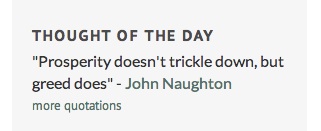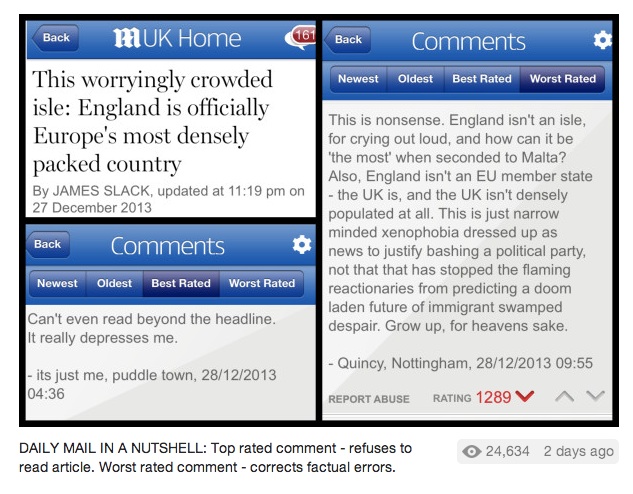My Observer colleague, Nick Cohen, had a terrific column in yesterday’s paper about the Jimmy Savile affair and the BBC’s behaviour in relation to it.
For readers not in the UK I should explain that we now know that Savile was one of the most prolific sexual abusers ever to escape justice. The scale of his crimes, says Cohen, “stands comparison with emperors or tyrants, who engaged in the mass rape of captive subjects. But unlike a dictator, Savile did not require arbitrary power to protect him. All he needed was for society to believe that he was a celebrity: a ‘national treasure’ no one could touch”. (Among other things, Savile was knighted by the Queen for his “charitable” services. And after he died he was laid out in state in Leeds and thousands queued for hours to pay their respects to the deceased hero. Truly, you could not make this stuff up.)
There has been a big inquiry under way, led by a senior retired judge, which is about to issue its report. But we already know that Savile’s grisly predilections and behaviour were well known within the BBC when he was one of its most famous broadcasters. The Observer reported yesterday that the inquiry would reveal that he had abused over a thousand children and young people, many of them on BBC premises.
In the end, two BBC journalists — Liz MacKean, a reporter for the nightly Newsnight current affairs programme and her producer, Meirion Jones — found the evidence that Savile was a voracious paedophile. But their report was spiked by senior BBC management, possibly because, in another corner of the Corporation, there were plans in the works for a major celebratory documentary about Savile the ‘national treasure’.
Given that MacKean and Jones were the first journalists in the BBC to wish to tell the truth about Savile, you’d have thought that they would be regarded as heroines. After all, the BBC’s Royal Charter requires all BBC journalism to strive “to be impartial, accurate and independent”. But that’s not what happened. Here’s how Nick Cohen puts it:
The BBC has not treated its whistleblowers honourably or encouraged others to speak out in the future. Liz MacKean has had enough. Her managers did not fire her. They would not have dared and in any case the British establishment does not work like that.
Instead, they cold-shouldered her. MacKean was miserable. The atmosphere at work was dreadful. The BBC wouldn’t put her on air. She could have stayed, but she did not want to waste her time and talent and end up a bitter old hack. She chose the life of a free journalist instead and went off to work in independent – in all sense of that word – television.
She had been at the BBC for 24 years. Not a single manager came to her leaving party; even though the Pollard inquiry into the BBC’s handling of the Savile affair had vindicated her and Jones’s banned reports; even though every new revelation about Savile and every new celebrity arrest vindicated them further.
Jones, by contrast, stayed at the BBC. He has found a bolt hole at Panorama, which tried to save what was left of the BBC’s honour by producing an exposé of the Savile cover-up. But it is common knowledge that the BBC management will never promote him. His colleagues say he’s had offers to write a book about Savile or to work for independent television, and I wouldn’t be surprised if he took them.
At no point has Chris Patten, the chairman of the BBC Trust, offered Jones or MacKean his support or thanks. If the BBC had run their reports, it would have made all the difference. It could say now that at least it had the integrity to break the news about the crimes of one of its biggest stars. Liz MacKean and Meirion Jones acted in the best interests of the corporation. They were its true defenders. No good did it do them.
This is all par for the course. Moral courage is the scarcest commodity in our society. And whistleblowers are often the embodiment of it. The reason they are detested is partly because they sometimes undermine powerful commercial, organisational or political interests, but mainly because they highlight how compromised and cowardly the rest of us are.
And this is an old, old story. I first began to think about it as a student when I saw a production of Ibsen’s Enemy of the People, a scarifying play on this theme. Here’s how Wikipedia summarises the plot:
Doctor Thomas Stockmann is a popular citizen of a small coastal town in Norway. The town has invested a large amount of public and private money towards the development of baths, a project led by Stockmann and his brother, Peter, the Mayor. The town is expecting a surge in tourism and prosperity from the new baths, which are said to be of great medicinal value, and as such, a source of great local pride. Just as the baths are proving successful, Stockmann discovers that waste products from the town’s tannery are contaminating the waters, causing serious illness amongst the tourists. He expects this important discovery to be his greatest achievement, and promptly sends a detailed report to the Mayor, which includes a proposed solution which would come at a considerable cost to the town.
To his surprise, Stockmann finds it difficult to get through to the authorities. They seem unable to appreciate the seriousness of the issue and unwilling to publicly acknowledge and address the problem because it could mean financial ruin for the town. As the conflict develops, the Mayor warns his brother that he should “acquiesce in subordinating himself to the community.” Stockmann refuses to accept this, and holds a town meeting at Captain Horster’s house in order to persuade people that the baths must be closed.
The townspeople — eagerly anticipating the prosperity that the baths will bring — refuse to accept Stockmann’s claims, and his friends and allies, who had explicitly given support for his campaign, turn against him en masse. He is taunted and denounced as a lunatic, an “Enemy of the People.” In a scathing rebuttal of both the Victorian notion of community and the principles of democracy, Stockmann proclaims that, in matters of right and wrong, the individual is superior to the multitude, which is easily led by self-advancing demagogues. Stockmann sums up Ibsen’s denunciation of the masses with the memorable quote “…the strongest man in the world is the man who stands most alone.” He also says: “A minority may be right; a majority is always wrong.”
Right on.

